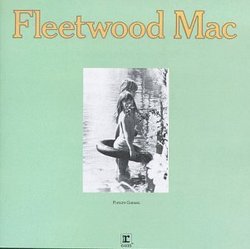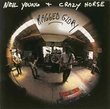| All Artists: Fleetwood Mac Title: Future Games Members Wishing: 9 Total Copies: 0 Label: Warner Bros / Wea Release Date: 10/25/1990 Genres: Pop, Rock, Classic Rock Styles: Blues Rock, Album-Oriented Rock (AOR) Number of Discs: 1 SwapaCD Credits: 1 UPCs: 075992745826, 075992745840 |
Search - Fleetwood Mac :: Future Games
 | Fleetwood Mac Future Games Genres: Pop, Rock, Classic Rock
|
Larger Image |
CD DetailsSimilar CDs
Similarly Requested CDs
|
Member CD ReviewsReviewed on 11/28/2006... Great Fleetwood Mac from their years between being a blues band and the advent of Stevie and Lindsey. 1 of 3 member(s) found this review helpful.
CD ReviewsFantastic Fleetwood and his Fine Three Associates Brian P. Colwell | Mansfield, Massachusetts United States | 04/22/2005 (5 out of 5 stars) "Most people know Fleetwood Mac as that great band featuring the etheral Stevie Nicks with such classic tunes as "Rhiannon" / "Don't Stop" / "Go Your Own Way" .... but they don't realize that this band has been around since the 1960s and once had firm roots in blues. Alot of changes took place within the band over the years, but such is common in our own individual lives and relationships. "Future Games" came out in 1971 and featured a new promising yet risky line-up. In my opinion, this is Fleetwood Mac's best line-up because the work they put forth (up until 1974) was clever, unique, talented, enjoyable and overall special. Bob Welch was a perfect frontman for the band, bridging the gap between blues, soul, jazz and R&B .... which brought these influences to the musical table, and thus layed the foundation for what would later become and unforgettable, smash-hit group that most still revere today. Danny Kirwan was gentle in production and touching in singing. Christine McVie is truly an underrated singer/songwriter in an era where women were just starting to get their feet into that particular creative door. John McVie could sure knock the crowd off its axis with his precise, highly skilled and effective bass work. And finally, Mick Fleetwood (the source of it all both then and now) could be mellow and heavy interchangably with the drums. Each song is great and surprisingly different on "Future Games" so I'm hard-pressed to pick a standout favorite. I certainly Christine's soft but crescendo-filled chorus of "Show Me A Smile". "Sands Of Time" is an amazing treasure by Danny Kirwan that allows John McVie and Mick Fleetwood to shine together right with him (the blend of all the work within this track shows perfectly how much of a musically skilled/gifted band Fleetwood Mac is). Bob Welch mystifies the listener into virtual hypnosis with his laid-back but peppy piece which is the title track. The band also showed themselves to have a great flair for top-knotch harmonies. Much time has passed since the 70s, but this album will never get old for me. I'm glad I was able to look past all the glitz and hype of Fleetwood Mac NOW and checked out Fleetwood Mac THEN. I urge all musical fans of the group, or just this type of music in general, to go out and find this gem. I listen to it nearly everyday, and it manages to find a way to put me in a good, tranquil, almost spiritually-complete mood. After all, that is what music should be doing for the listener .... filling up the time and not just taking out what's in the wallet." Deep, inspiring Fleetwood Mac Shaw N. Gynan | Bellingham, WA USA | 10/10/2005 (5 out of 5 stars) "This beautiful record brings back fond memories of graduate school in Austin, Texas, and a friendship I had with an unusual young man, very troubled, really, but brilliant, and an admirer of this wonderful album. The CD release was important, because the music is so atmospheric, and intolerant of the surface noise that was inevitable on vinyl.
Woman of a Thousand Years is, as all fans know, utterly classic, perfect in conceptualization, and a fairly extended piece, over seven minutes. Morning Rain is a great rocker, nicely harmonized and performed with professional assurance. The title song of the album is over eight minutes long, of reverberant and bluesy acoustic. It's totally fantastic, and as another reviewer put it, mesmerizing. This is music to groove to. As if that masterpiece weren't enough, Sands of Time is the astonishing follow up, beautifully harmonized and, ultimately, a totally driving and inescapable rocker. The folksy Sometimes is so wistful, so simple, so convincing. What other pop group ever wrote and performed such compelling and genial music? "Sometimes I get to thinking about the times we used to have, but now you've gone away and left me, so alone. Although my back is aching, I work the whole day through, although that you feel that I've been wasting all my time. Taking the sun from the sky, lifting our hearts to the day." This home-run of an album ends with another gem, Show Me a Smile, and Christine McVie's winning plea. This should be enough to convince people to buy this spectacular album." |

 Track Listings (8) - Disc #1
Track Listings (8) - Disc #1











